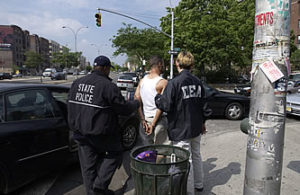If Americans want to diminish racial bigotry in police departments across the country, the best way to start is by legalizing drugs, all of them. That would bring an end to the legal opportunity that bigoted cops have in the enforcement of drug laws against blacks.
I’m not saying that all cops are racial bigots. We all know that they’re not. But we also know that some of them are. And the drug war permits them to exercise their racial bigotry to their heart’s content — and even get praised and thanked for their service while doing so.
After all, let’s face it: there are racial bigots in society, and there will always be racial bigots in society. Anyone who thinks he is going to wipe out racial bigotry through “education” and “enlightenment” is living in la la land.
When someone engages in racial bigotry on a private level, he is subject to private and peaceful retaliatory measures, such as loss of sales if he is a business owner or the loss of a job if he is an employee. He is also subject to criticism and social ostracism. The free society makes the bigot bear an economic and social penalty for his bigotry, which might well nudge, not force, him into better behavior.
It’s totally different with drug laws. They have converted police departments into magnets for racial bigots. With the drug war, cops are empowered to stop blacks arbitrarily and subject them to abusive interrogations and intrusive, demeaning, and oftentimes violent searches and seizures of their persons, automobiles, and homes.
As long as they are “searching for drugs,” it’s all okay. No loss of sales. No loss of job. No public criticism. No social ostracism. Hey, they are helping cleanse our society of illegal drugs! They’re considered heroes! People praise them for their courage and thank them for their service.
That includes many judges, some of whom do not hesitate to mete out extraordinarily long jail sentences to blacks. A good example is a black man in North Carolina named Michael Holmes who has now served some 30 years of a 200-year jail sentence for a non-violent drug offense. There are thousands more like him.
The drug war also provides bigoted cops with the perfect opportunity to frame blacks for drug offenses by planting drugs on them or by simply lying about drug transactions. As prosecutors ask jurors, “Who are you going to believe — this upstanding (white) police officer who is simply trying to keep drugs from reaching your children or this (black) defendant who obviously has a motive to lie?” The false and fraudulent arrests, prosecutions, convictions, and harsh jail sentences meted out to dozens of innocent blacks in Tulia, Texas, several years ago is just one example of this phenomenon.
The noted academician Michelle Alexander rightly calls the drug war the new Jim Crow. It gives bigoted cops a license to do what bigoted cops did during the days of racial segregation. In fact, the drug war is without a doubt the most racially bigoted government program since segregation.
The legalization of drugs would, of course, not end racial bigotry in society. But it would end the opportunity that drug laws given cops to legally exercise racial bigotry. Unable to exercise their bigotry legally though the enforcement of the drug war, police departments would no longer serve as a magnet for racial bigots. Those who are already cops would begin drifting back into the private sector where they would be nudged toward more appropriate behavior with such things as boycotts, criticism, and social ostracism rather than praised and thanked for their bigoted enforcement of the drug war.


